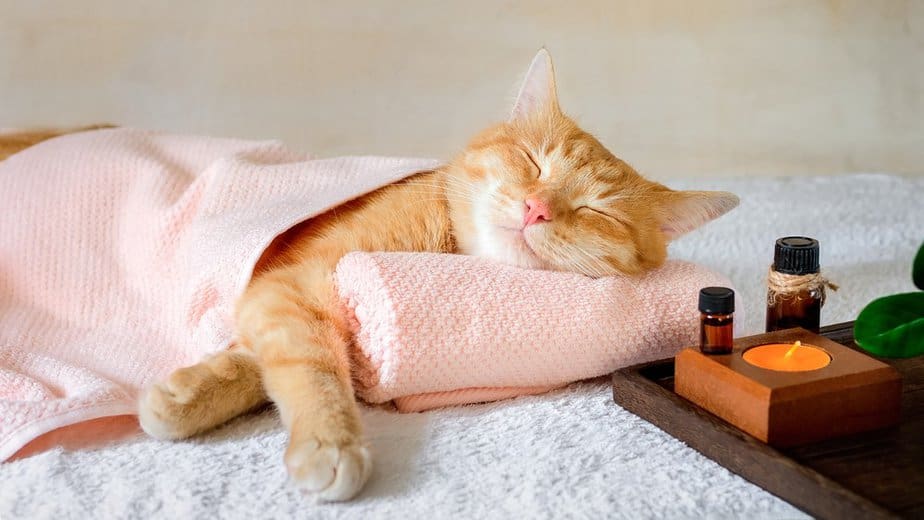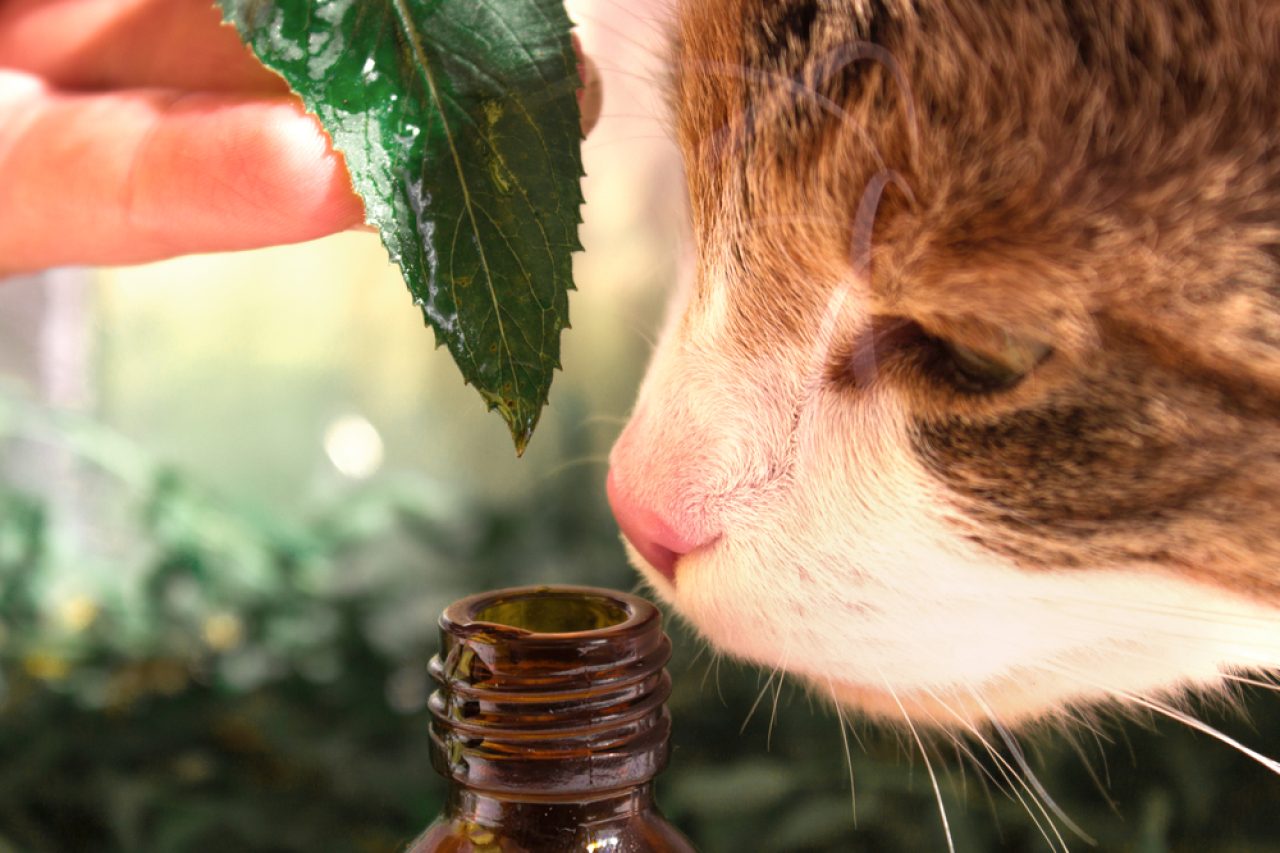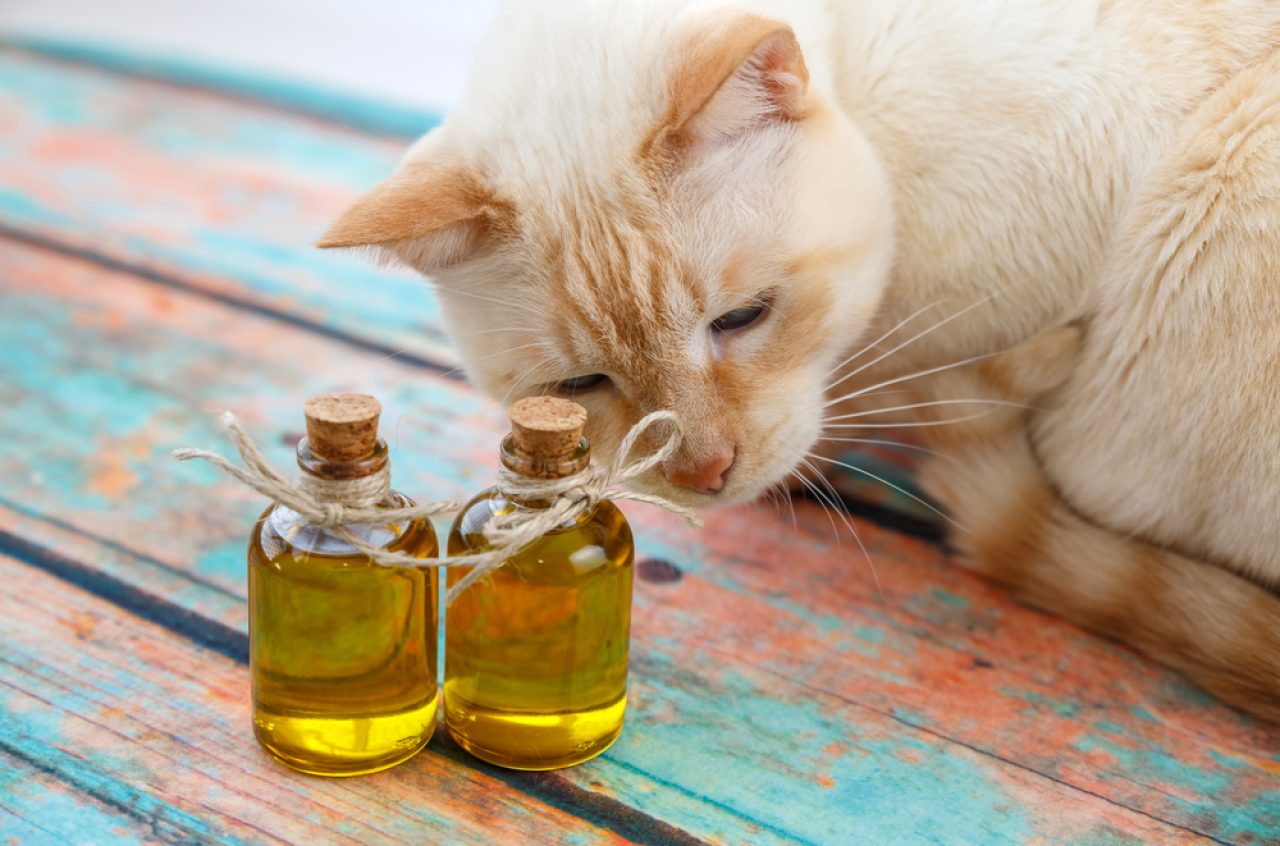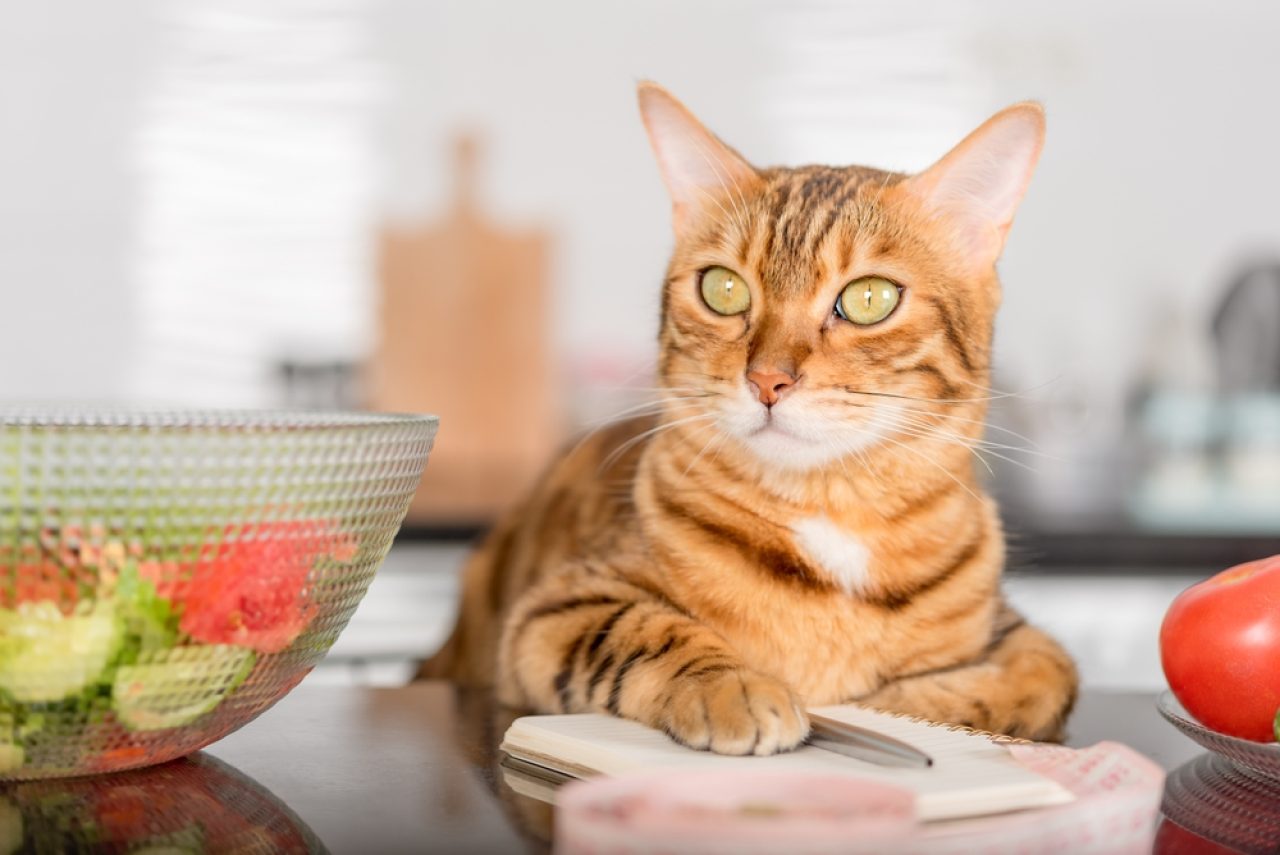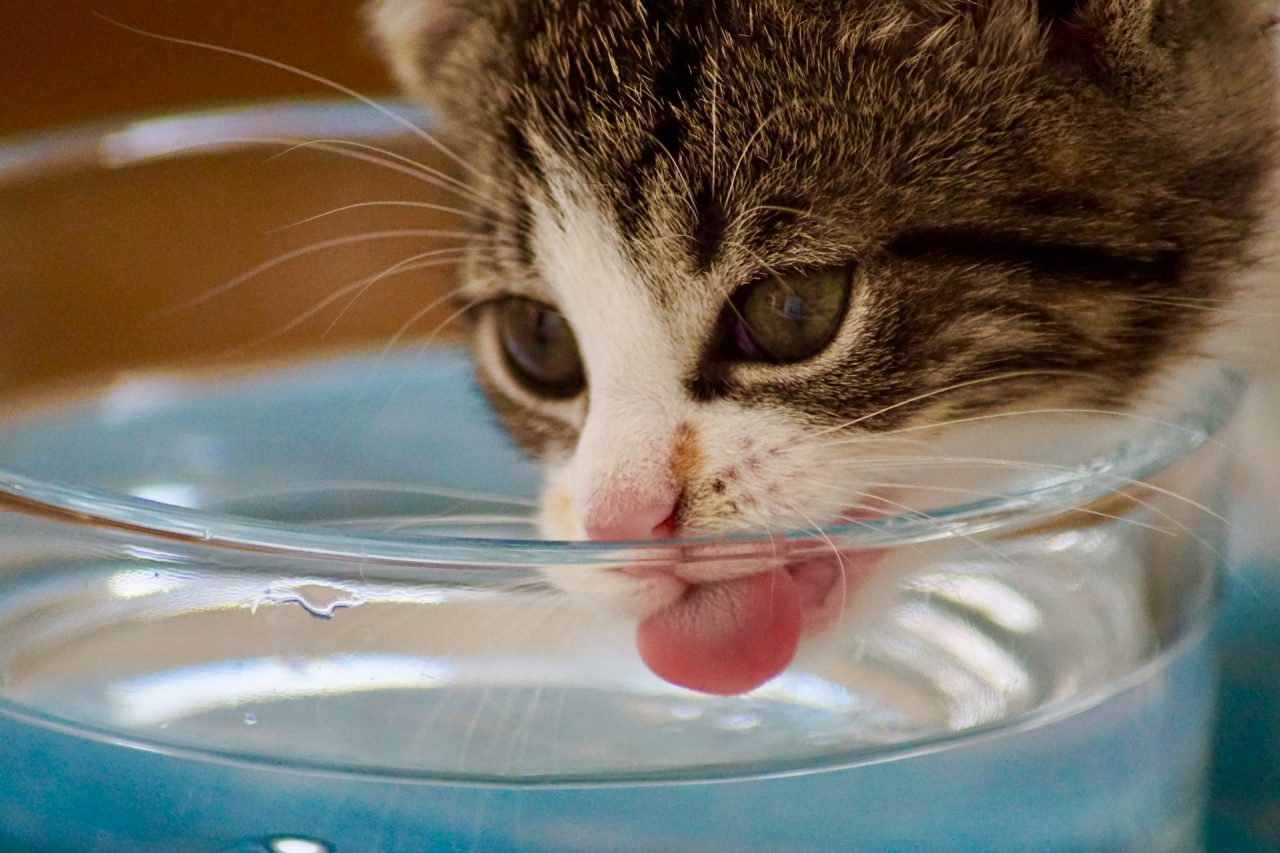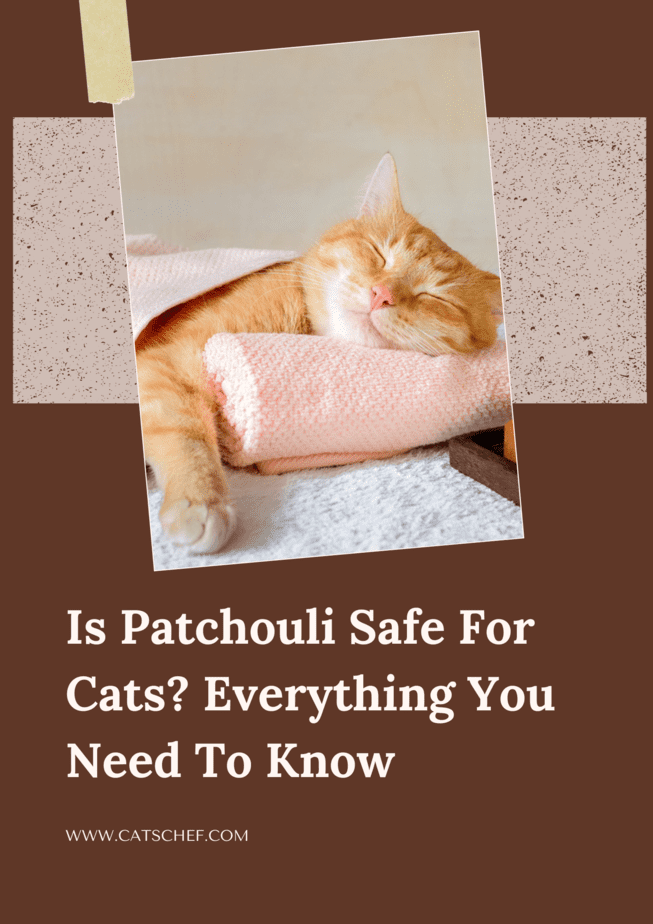📖 Table of Content:
As proud cat owners, we always have tons of questions. “Can my cat eat this? Is it okay to keep her in one room the whole day? Is Patchouli safe for cats? Why is my cat afraid of water?” The list goes on and on. Today, we are going to answer one of them, and it’s the one concerning essential oils.
Many people like to use essential oils in their houses, but not many of them know that there are some oils that are toxic for our kittens. If we need to keep them safe and prevent them from poisoning, we need to learn more about this topic.
Luckily, you’re at the right place. So let’s learn something that will help you treat your cat the right way.
Essential oils
Essential oils are removed from different plants. They are mostly used in aromatherapy, as a way of alternative healing.
These oils capture the scent of different plants. That’s why each oil that is made from a different plant has a different aroma.
They are obtained through distillation or other mechanical methods like cold pressing. After those aromatic chemicals are extracted, they are mixed with carrier oil to get the final product.
Essential oils are mostly used to relieve pain and cramping, improve respiratory health, or even heal skin conditions. Common belief says that they have the power to relieve congestion, promote healthy sleep patterns, and boost our mood.
What is Patchouli oil?
Essential patchouli oil is made from the leaves and stems of the patchouli plant, a type of aromatic herb. These parts of the plant are harvested, dried, and then used to make oil.
Researchers have only recently started looking into a variety of patchouli oil’s uses and advantages so we don’t know much about their benefits.
Due to its intense musky aroma, patchouli oil is said to have derived its name from the Hindi word “pacholi,” which means “to scent.” You can only imagine how strong it must be.
The well-known aromatic plants mint, lavender, and sage are all members of the same family as patchouli. As the essential oil ages, its color darkens into an amber tinge, and its aroma gets smoother and richer.
Is Patchouli safe for cats?
The thing is, Patchouli is nowhere on the list of toxic ingredients but you also won’t find it on the list of safe ones. However, it’s always better to stay on the safe side so we advise you to keep your pet away from it. Since it’s an essential oil, there’s a high chance that it’s harmful to your feline.
Essential oils can be absorbed by our bodies in two ways, orally or through the skin. After that, they are metabolized by the liver. Unfortunately, cats don’t have the enzyme necessary to process these compounds and get rid of the toxic things.
Patchouli is one of the strongest oils in the world. It’s even harmful to humans because applying it directly to our skin might cause burns or itchiness. We can add less powerful oils like avocado and jojoba to it to weaken its effects.
Now, think about what this oil, which has enough power to hurt us, can do to our kittens if they inhale it or absorb it through their skin. Their bodies definitely aren’t able to deal with such strong compounds.
It’s also important to say that Patchouli has certain ingredients that are also present in household cleaners. Our cats don’t have the ability to remove phenols and phenolic compounds from their bloodstream.
And if they ingest it or their skin gets in touch with it, that compound will quickly reach toxic levels that can cause many difficult symptoms. If left untreated, this may lead to more serious complications and eventually, death.
What are the symptoms of Patchouli poisoning in cats?
So, is Patchouli safe for cats? No, and here’s what you need to know.
If you’re a cat owner, especially one who uses essential oils, you must know the symptoms of essential oil poisoning in cats. If you’re using them but chose the oils that are safe for your cat, it should be fine. But sometimes, they can still hurt your feline.
That’s why it’s best you learn these most common symptoms of poisoning:
– Having trouble walking (poisoned cats appear shaky, and they trip easily)
– Vomiting
– Diarrhea
– Lack of appetite
– Drooling
– Signs of shock (usually lower heart rate, difficulties with breathing, and low body temperature)
– Shaking
– Symptoms common for liver failure (yellow skin and eyes)
– Small seizures
– Paralysis.
As you can see, essential oils can be very dangerous for your cats. That’s why you should be extremely careful if you choose to use them. And as we could already conclude, Patchouli is not really safe for cats.
If you suspect that your feline has come in contact with your essential oil, you shouldn’t wait to see these symptoms. Instead, you should take her to the vet right away and prevent possible consequences.
And if you’ve already noticed some of these symptoms (no matter one or five) and you think your cat might be suffering from essential oil poisoning, don’t waste time. Ring your veterinarian and tell them you’re coming. This is a serious problem that requires professional help.
What should you do if your cat licked Patchouli oil?
If you suspect that your cat came in contact with, or even took a lick the Patchouli oil, you need to take her to the vet as soon as possible. It’s very important to obtain a diagnosis and start treatment as soon as possible.
You can call the nearest vet and explain the situation, they will let you come immediately. The sooner your cat starts the treatment, the better the prognosis and outcome will be.
Some people think that forcing their pet to vomit is going to help, however, it’s not helpful at all. In fact, it could make the condition even worse. So you need to remember not to do this if you think your pet is having essential oil poisoning.
Before going to the vet, you should take the product that caused the symptoms and bring it to the veterinary clinic so it’s easier to find the right treatment. Patchouli oil is not safe for cats, so we need to do everything we can to quicken their recovery.
If you notice a drop of oil on your skin or cat’s fur, make sure to clean it right away. It’s best to use a liquid dishwashing detergent. That’s because Patchouli essential oil’s chemicals are very strong, and skin can easily absorb them.
Young cats and kittens, as well as those who are living with liver disease, are more vulnerable when it comes to essential oil poisonings. In addition to this, it’s something that can hurt us as well, as Patchouli oil can irritate or burn the skin and mouth.
How to protect your cat?
We’ve learned that Patchouli and some other essential oils are toxic for our cats. But now we need to learn how to keep them safe.
First of all, you need to keep your essential oils away from your kittens. The farther, the better. They are explorers and like to touch and smell everything they can grab. But if they do it with these oils, they are likely to poison themselves.
It’s best you keep them in high, out-of-the-way cabinets. And to seal them in a plastic bag to lock their scent in both the bag and the cabinet. Our cats can smell things we can’t, so we need to ensure it’s well hidden.
If you decide to spray some of the essential oils in the room, it’s best to keep your cats out of it and lock the doors until the smell is gone. If you want to speed up the process, you can open a window and turn on a fan or an AC.
In addition, you should never use oils for more than two weeks in a row, as it’s not good for you or your pet. After two weeks of using them, you should take at least one free week.
Which essential oils are safe for cats?
If you’re a cat owner who really likes essential oils, I have some good news for you. There are a few essential oils that are much safer for cats than the Patchouli one.
However, it’s still best to get these products in their purest form possible. That way you’ll make sure that other ingredients that could be harmful to your feline aren’t in the mixture.
Here are some of the safer alternatives to Patchouli oil.
Cedarwood oil is used to protect the body from bacteria, quicken wound healing, solve muscle aches, joint pain, or stiffness, soothe coughs, as well as stimulate circulation.
Valerian oil has a history of use extending back to ancient Greek and Roman times. People mostly use it because it’s famous for its calming effects that help with stress and insomnia.
Copaiba oil is derived from the resin of the copaiba tree which is found in tropical South America. The main uses include faster wound healing, pain relief, to treat infections, including bladder infections and even strep throat.
Frankincense oil is used because it can clear the nasal passageway, promote the relief of congestion, and help with breathing problems.
Helichrysum oil comes from a special flower that is famous for preventing signs of aging.
It’s still very important to remember that you should never place these essential oils directly onto your cat, or leave them within their reach. Even though they are considered non-toxic, your cat is still likely to get sick if they ingest these oils.
Conclusion
I hope you no know the answer to the question, “Is Patchouli safe for cats?” Using it is not recommended if you’re a cat owner. Luckily, there are other options that you can use instead if you’re a big fan of essential oils.
However, whichever oil you choose, you still need to be careful and try to protect your cat from reaching it. Her body isn’t able to deal with such strong compounds and we need to make sure not to cause any trouble to them.
And the last thing we need to remember is to call the vet as soon as our kittens start showing any of the symptoms I mentioned above, or we just suspect that they came in contact with one of the toxic essential oils.
